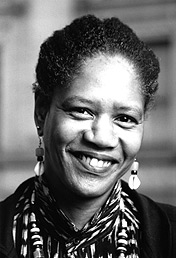Berkeleyan
Obituary
VèVè Clark
![]()
16 January 2008
VèVè Amasasa Clark, an associate professor of African American studies and a literary scholar who coined the term "diaspora literacy," died Dec. 1 at Alta Bates Hospital in Berkeley after being found at home in a coma. She was 62.
 |
During her 16 years on the African American studies faculty here, Clark, who was instrumental in helping create at Berkeley the nation's first doctorate program in African-diaspora studies, became an expert on such topics as African oral expression and the Francophone novel.
"Her theorization of 'diaspora literacy' has functioned as a model for numerous scholars in the field, here in the United States and in the Caribbean. She will be sadly missed," said Suzette Spencer, an assistant professor of African American studies at the University of Wisconsin, Madison, and a former student of Clark's.
Clark's urbane manner was reinforced by her multilingualism. She spoke fluent French, Spanish, and Creole and had a fair understanding of Wolof, a language spoken in Senegal, Gambia, and Mauritania. She co-edited The Legend of Maya Deren (1985), a biography of the avant-garde filmmaker and theorist, and Kaiso! Katherine Dunham: An Anthology of Writings (1978), about the iconic dancer and choreographer who died last year.
"She was the epitome of a brilliant scholar, passionate thinker, gifted writer, and master teacher," said Ula Taylor, chair of the Department of African American Studies. "As a colleague, she was a woman of integrity who was committed to encouraging younger faculty to embrace their own intellectual voice."
As a mentor and champion for black scholarship, Clark worked on the retention of African American students and sought to provide a support network for graduate students in African American, African, and Caribbean studies.
Clark was born Dec. 14, 1944, and grew up in the New York City borough of Queens. As a child she first contemplated becoming a doctor and then a musician, according to an interview she did in 1996, when she became the inaugural recipient of Berkeley's Social Sciences Distinguished Service Award.
As an undergraduate in Queens College at the City University of New York, Clark majored in romance languages. After receiving her bachelor's degree in 1966, she continued her language studies at the Université de Nancy in France, where she earned a Certificat d'Études Supérieures. She returned to Queens College and received her master's degree in French in 1969.
During the 1970s, Clark headed west to Berkeley, where she worked as a teaching assistant in French and then as a lecturer in what was then called Afro-American studies. She also taught French at an experimental collegiate seminar program on campus that was known informally as Strawberry Creek College.
Daphne Muse, director of the Women's Leadership Institute at Mills College in Oakland, met Clark in 1973, when they were both teaching at Berkeley. The two quickly became close friends, and Clark officiated at Muse's wedding.
"She would have me on the floor in tears with laughter. She had an uncanny ability to mimic, and she was just brilliant," said Muse. "She was also incredibly generous, both spiritually and financially."
In 1980, Clark was hired as an assistant professor of African and Caribbean literature at Tufts University in Massachusetts. During that time, she worked on her Berkeley Ph.D. thesis in French and ethnology, receiving her degree in 1983. In 1986, Clark was promoted at Tufts to associate professor of African and Caribbean literature.
In 1991 she returned to Berkeley as an associate professor of African American studies. That same year, Clark won recognition for coining the phrase "diaspora literacy" in a paper titled "Developing Diaspora Literature and Marasa Consciousness." She defined the term as the ability to understand multilayered meanings of stories, words, and folk sayings in African diaspora communities through the knowledge and lived experiences of the community members' cultures.
During Clark's career, she received numerous awards, including a Guggenheim fellowship for research on choreographer Katherine Dunham and a graduate fellowship for study at the Université de Dakar, Sénégal. She also was a Rockefeller Foundation fellow-in-residence at Brown University.
Clark is survived by a wide circle of friends, colleagues, and students. A memorial gathering in celebration of her life and legacy was held on campus on Dec. 14.
- Yasmin Anwar

